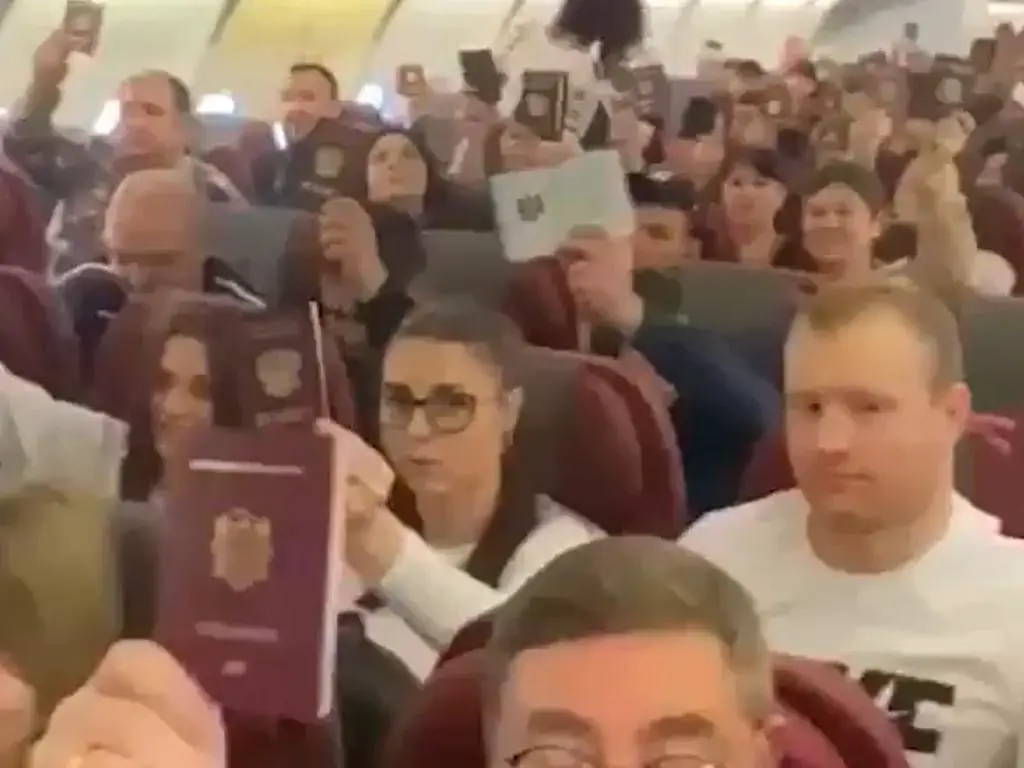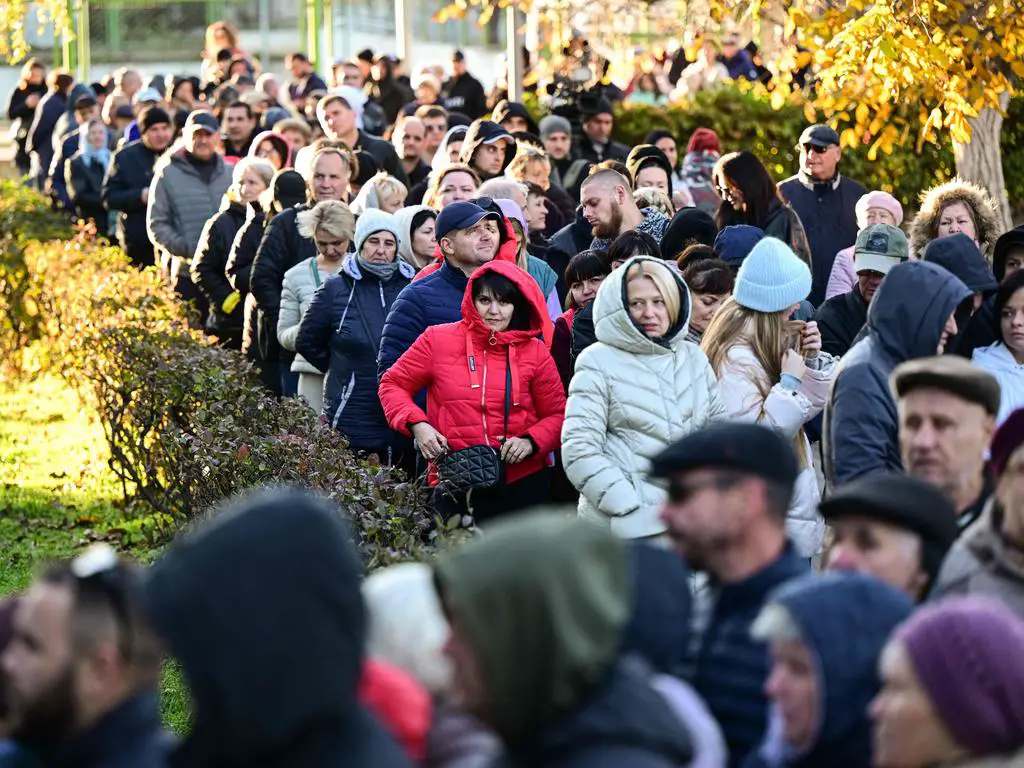In recent years, Russian influence in Eastern Europe has loomed large, with Moldova emerging as a focal point in a political game driven by power, influence, and intimidation.
The recent Moldovan presidential election provides a case study of an alleged large-scale interference operation, encompassing everything from cyber-attacks and vote-buying to chartered flights for expat voters and bomb threats.
The unfolding events echo previous allegations against Russia, but Moldova’s methods are unprecedented in scope and audacity.
Russia’s alleged interference in Moldova’s election represents a multifaceted campaign aimed at securing a pro-Kremlin candidate, Alexandr Stoianoglo, in power while undermining Moldova’s current president, Maia Sandu, a Western-leaning leader pushing for closer ties with the European Union.
For Moldovans, these events represent more than an election; they underscore the fragility of democracy and the challenges of maintaining sovereignty in the face of foreign intervention.
Moldova’s Strategic Importance
Moldova, a small and economically struggling nation in Eastern Europe, shares a border with Ukraine and occupies a strategic position near the EU’s frontier. The country’s geopolitical significance is heightened by its past as part of the Soviet Union and its proximity to ongoing conflicts, such as Russia’s invasion of Ukraine. President Maia Sandu’s discussions with the European Union about membership add to the political tension, aligning Moldova more closely with Western interests and directly opposing Russia’s influence in the region.
Historically, Moldova has found itself in a tug-of-war between pro-Russian and pro-European factions, a dynamic that has intensified as President Sandu seeks to steer the country toward the EU. This Western pivot represents a significant departure from Moldova’s longstanding political landscape, effectively positioning Sandu as a potential adversary of Kremlin interests.
The alleged Russian interference in Moldova’s election appears to have employed a mix of coercive and technological methods aimed at swaying the electorate. These efforts reportedly included everything from orchestrating chartered flights for expat voters to issuing bomb threats and deploying cyber-attacks. Each method serves a unique purpose within the broader strategy, signaling a highly coordinated approach to election interference.
One of the most startling aspects of the alleged interference involves the chartered flights reportedly used to transport Moldovan expatriates back to the country to vote. Videos of these packed flights have emerged, suggesting an organized effort to bring overseas voters sympathetic to the Kremlin’s candidate, Alexandr Stoianoglo, back to Moldova. These flights symbolize the tangible lengths to which Russia is allegedly willing to go to secure favorable election outcomes, effectively importing votes to sway the results.
This tactic is concerning as it raises questions about the autonomy of Moldova’s electoral process. While expatriates have the right to vote, the orchestration of large-scale flights under suspicious circumstances implies an engineered voting bloc, further skewing an already fragile election.

Cyber-attacks: Targeting the Infrastructure
Cyber-attacks have become a common tool in Russia’s playbook for influencing foreign elections, and Moldova was no exception. Reports of coordinated cyber-attacks emerged in the days leading up to the election, with local government websites and digital voting infrastructure allegedly targeted in an attempt to create chaos and undermine confidence in the process.
Such attacks are intended not only to disrupt but also to erode trust in democratic institutions. Cyber-attacks can delay vote counting, prevent transparency, and create an atmosphere of uncertainty that plays directly into the hands of destabilizing forces. By compromising Moldova’s digital infrastructure, Russia can indirectly influence voter sentiment, potentially swaying undecided citizens toward a pro-Russian candidate who promises stability in the face of perceived instability.
In addition to cyber-attacks, a series of bomb threats reportedly targeted polling stations, adding a palpable layer of fear to the electoral process. These threats serve as psychological tools, deterring voters from participating in the election and especially affecting those who might lean toward Sandu’s pro-European stance. Voter intimidation is a classic tactic used to manipulate election outcomes by reducing turnout or discouraging specific demographics from casting their votes.
The bomb threats heighten anxiety and uncertainty, not only creating logistical challenges for authorities but also fostering a sense of vulnerability among the populace. For a nation already grappling with economic and security concerns, these incidents reinforce the narrative that Moldova is under siege, further complicating its path toward democratic stability and closer integration with the EU.
Impact on Moldova’s Political Landscape
The alleged interference has had immediate and long-term implications for Moldova’s political landscape. In the short term, the election was highly polarized, with nearly half of the electorate supporting Stoianoglo and his pro-Russian platform. Although President Sandu ultimately claimed victory, the narrow margin underscores the effectiveness of Russia’s alleged tactics and the depth of division within Moldova.
The long-term impact of this interference is potentially more destabilizing. Sandu’s pro-European stance and dialogue with the EU signify a shift toward the West, which is not only politically but also economically transformative for Moldova. However, the Kremlin’s continued interference suggests that Russia views Moldova as a non-negotiable part of its sphere of influence, unwilling to allow the nation to drift toward Western alliances without resistance.
The international community has watched Moldova’s election closely, with the EU and the United States expressing concerns about Russia’s influence. The alleged interference has highlighted the limitations of Western powers in safeguarding smaller nations from such tactics, despite increased sanctions and diplomatic pressure on Russia. These events underscore the need for more robust election security measures and highlight the importance of international support for Moldova’s sovereignty and democratic institutions.
From a security perspective, Moldova’s situation is precarious. The election interference has demonstrated Russia’s willingness to employ hybrid warfare tactics to destabilize its neighbors, an approach that blends conventional aggression with cyber-attacks, psychological operations, and economic pressure. For Moldova, this reality means that its sovereignty is not solely a matter of domestic governance but is entangled with the interests and strategies of larger powers.

Moldova’s Path Forward in a Fractured Landscape
As President Sandu moves forward in her term, she faces the challenging task of strengthening Moldova’s democratic institutions while maintaining a delicate balance between East and West. The alleged interference has left the Moldovan public divided, with significant portions of the population still supportive of pro-Russian policies. Reconciliation and unity will be key to avoiding further polarization, but this will be difficult amid external pressures.
Sandu’s pro-EU stance may ultimately attract more direct support from the EU, potentially leading to increased funding, security assistance, and political backing. However, Moldova’s path toward EU integration is fraught with obstacles. Beyond the internal divisions, Moldova must contend with potential retaliation from Russia, including economic sanctions, further cyber-attacks, or even military provocations in the contested region of Transnistria.
Moldova’s recent election illustrates the stark challenges facing emerging democracies in Eastern Europe, particularly those caught in the crosshairs of Russian influence. The alleged interference in the election highlights Russia’s continued interest in exerting control over its former Soviet territories, using a blend of modern technology, coercion, and psychological tactics to achieve its aims. For Moldova, these events are a stark reminder of the cost of pursuing a Western-oriented future.
The political impact of the alleged interference extends beyond Moldova’s borders, serving as a warning to other nations within Russia’s sphere of influence. The international community’s response to Moldova’s struggle will shape the region’s future, signaling to both Russia and other small democracies whether global powers are prepared to defend democratic principles in the face of foreign aggression.
As Moldova grapples with the consequences of this election, its resilience will be tested. For President Sandu, the challenge lies not only in steering her country toward European integration but also in fortifying its institutions against future interference. The path forward for Moldova is uncertain, but its journey will serve as a pivotal case in the ongoing struggle for sovereignty, democracy, and stability in Eastern Europe.



